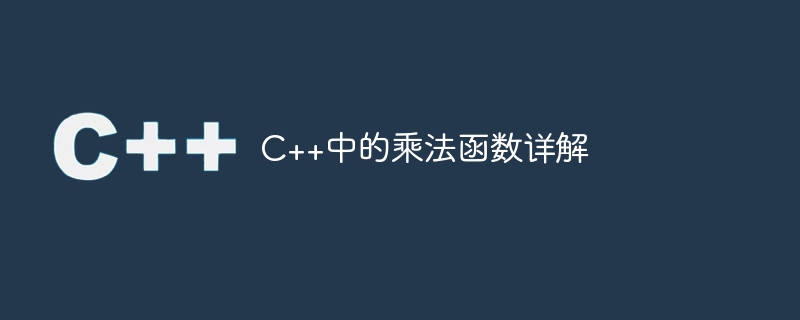

Detailed explanation of the multiplication function in C
In C programming, multiplication is a common and important operation. C provides a variety of ways to implement multiplication operations, including basic multiplication operators, function overloading, and templates. This article will introduce in detail the usage and precautions of the multiplication function in C.
The multiplication operator in C is *, which is used to multiply two operands. For example:
int a = 10;
int b = 5;
int c = a * b; //The value of c is 50
In addition to integer types, the multiplication operator can also Used for floating point numbers and other numeric types. Note that when using the multiplication operator, the types of the operands should match, otherwise the result will be indeterminate.
Function overloading is a powerful feature in C that allows functions with the same name but different parameter lists to be defined in the same scope. Through function overloading, polymorphism of multiplication operations can be achieved. For example, you can define a multiplication function that accepts two integers as parameters and returns the multiplication result:
int multiply(int a, int b) {
return a * b;
}
At the same time, also You can define a multiplication function that accepts two floating point numbers as parameters and returns the multiplication result:
float multiply(float a, float b) {
return a * b;
}
Through function overloading , different multiplication functions can be selected for calculation according to different types of parameters.
Template function is a general function definition method in C, which can accept any type of parameters for calculation. By using template functions, the multiplication operation can be made generic. For example, you can define a template function that accepts two parameters and returns the result of multiplication:
template
T multiply(T a, T b) {
return a * b;
}
When calling this template function, you can pass any type of parameters, including integers, floating point numbers and custom data types.
In C, calling the multiplication function is similar to calling an ordinary function. According to the definition of the function, just pass the parameters of the corresponding type. For example:
int result1 = multiply(5, 10);
float result2 = multiply(2.5f, 3.2f);
double result3 = multiply
It should be noted that when using a template function, you can specify the parameter type of the function template by specifying the template parameters.
When using multiplication functions, there are some things to pay attention to:
Summary:
This article introduces in detail the usage and precautions of the multiplication function in C. Through multiplication operators, function overloading and template functions, the diversity and versatility of multiplication operations can be achieved. When using the multiplication function, you need to pay attention to data type matching, overflow issues, and template parameter selection. By rationally using the multiplication function, the code logic can be simplified, the readability and flexibility of the program can be improved, and thus the actual programming needs can be better met.
The above is the detailed content of Detailed explanation of multiplication function in C++. For more information, please follow other related articles on the PHP Chinese website!
 What are the differences between c++ and c language
What are the differences between c++ and c language
 Recommended learning order for c++ and python
Recommended learning order for c++ and python
 Cost-effectiveness analysis of learning python and c++
Cost-effectiveness analysis of learning python and c++
 Is c language the same as c++?
Is c language the same as c++?
 Which is better to learn first, c language or c++?
Which is better to learn first, c language or c++?
 The difference and connection between c language and c++
The difference and connection between c language and c++
 C++ software Chinese change tutorial
C++ software Chinese change tutorial
 Cost-effectiveness analysis of learning python, java and c++
Cost-effectiveness analysis of learning python, java and c++




